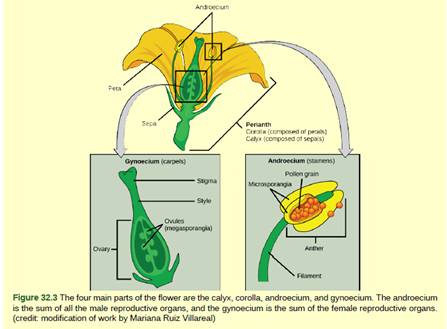
Concept explainers
Figure 32.3 If the anther is missing, what type of reproductive structure will the flower be unable to produce? What term is used to describe a flower that is normally lacking the androecium? What term describes a flower lacking a gynoecium?

To write:
Which type of reproductive system the flower will not be able to produce. The name of the flower that lacks androecium. The name of the flower that lacks gynoecium.
Introduction:
The main parts of the flower are calyx, corolla, androecium and gynoecium. The androecium is representing all the male reproductive parts and gynoecium represents all the female reproductive parts.
Explanation of Solution
Angiosperms are those plants which flower and the seeds produced are covered with carpel. The two distinct stages of plants are gametophyte and sporophyte. Through mitosis, the male and female gametes are produced. These gametes fuse to form a diploid zygote that develops to sporophyte that develops spores by meiosis.
During meiosis, the sporophyte gives rise to the male gamete, the pollen grain from the microspore and the female gamete, egg cell, from the megaspore. The megaspore and microspore cane be present in the same flower or different flowers. As both the spores are haploid, their fusion gives rise to a diploid zygote.
The anther or male gamete is a lobed structure having pollen grains for fusing with the egg cell. If the plant lacks this part, then the male gametes are absent leading to no reproduction. Hence, those flower lacking the androecium is called as a carpellate flower. Those flowers which lack gynoecium part is known as a staminate flower.
The flowers which do not have the anther will not be able to reproduce. The flowers without androecium are called carpellate flower and those without gynoecium is called as a staminate flower.
Want to see more full solutions like this?
Chapter 32 Solutions
Biology 2e
Additional Science Textbook Solutions
Campbell Biology: Concepts & Connections (9th Edition)
Anatomy & Physiology (6th Edition)
Microbiology: An Introduction
Campbell Biology (11th Edition)
Concepts of Genetics (12th Edition)
Applications and Investigations in Earth Science (9th Edition)
- Q8. A researcher wants to study the effectiveness of a pill intended to reduce stomach heartburn in pregnant women. The researcher chooses randomly 400 women to participate in this experiment for 9 months of their pregnancy period. They all need to have the same diet. The researcher designs two groups of 200 participants: One group take the real medication intended to reduce heartburn, while the other group take placebo medication. In this study what are: Independent variable: Dependent variable: Control variable: Experimental group: " Control group: If the participants do not know who is consuming the real pills and who is consuming the sugar pills. This study is It happens that 40% of the participants do not find the treatment helpful and drop out after 6 months. The researcher throws out the data from subjects that drop out. What type of bias is there in this study? If the company who makes the medication funds this research, what type of bias might exist in this research work?arrow_forwardHow do I determine the inhertiance pattern from the pedigree diagram?arrow_forwardits an open book assignemntarrow_forward
- Describe two different gene regulation mechanisms involving methylationarrow_forwardWhat is behavioral adaptarrow_forward22. Which of the following mutant proteins is expected to have a dominant negative effect when over- expressed in normal cells? a. mutant PI3-kinase that lacks the SH2 domain but retains the kinase function b. mutant Grb2 protein that cannot bind to RTK c. mutant RTK that lacks the extracellular domain d. mutant PDK that has the PH domain but lost the kinase function e. all of the abovearrow_forward
 Biology 2eBiologyISBN:9781947172517Author:Matthew Douglas, Jung Choi, Mary Ann ClarkPublisher:OpenStax
Biology 2eBiologyISBN:9781947172517Author:Matthew Douglas, Jung Choi, Mary Ann ClarkPublisher:OpenStax
 Concepts of BiologyBiologyISBN:9781938168116Author:Samantha Fowler, Rebecca Roush, James WisePublisher:OpenStax College
Concepts of BiologyBiologyISBN:9781938168116Author:Samantha Fowler, Rebecca Roush, James WisePublisher:OpenStax College Biology: The Dynamic Science (MindTap Course List)BiologyISBN:9781305389892Author:Peter J. Russell, Paul E. Hertz, Beverly McMillanPublisher:Cengage Learning
Biology: The Dynamic Science (MindTap Course List)BiologyISBN:9781305389892Author:Peter J. Russell, Paul E. Hertz, Beverly McMillanPublisher:Cengage Learning Biology (MindTap Course List)BiologyISBN:9781337392938Author:Eldra Solomon, Charles Martin, Diana W. Martin, Linda R. BergPublisher:Cengage Learning
Biology (MindTap Course List)BiologyISBN:9781337392938Author:Eldra Solomon, Charles Martin, Diana W. Martin, Linda R. BergPublisher:Cengage Learning





